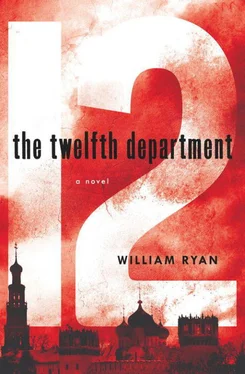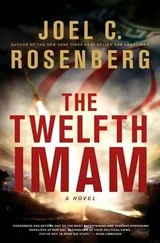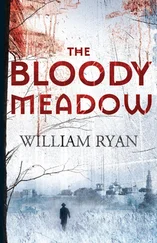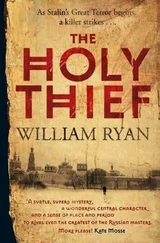“Are you all right?” Slivka asked as he entered Shtange’s apartment. The bloodstained carpets had been removed and the floorboards creaked underfoot.
“A missing son, no sleep, and an investigation that’s as likely to end up with me in the cells as the killer. I’ve had better days. Is there any news?”
“About the case?”
“Yuri first, if you’ve heard something.”
“Yasimov came by,” she said and then paused. It didn’t look as if Yasimov had brought good news.
“What did he have to say?”
“He thinks he picked up Yuri’s trail at Kievsky Station—still in the company of the two boys. You know about them?”
“Yes. And?”
“He’s pretty sure they got on a tram but he lost track of them after that. He said he was going to go to the depot to talk to the drivers—see if any of them remembers anything. But for the moment, the trail’s gone cold.”
Korolev nodded and picked up the phone, asking to be put through to the apartment building in Bolshoi Nikolo-Vorobinsky. The shared phone was in the hallway and the elderly Lobkovskaya, of the batlike ears, picked it up.
“It’s Korolev. Any sign of him?”
There wasn’t. He thanked the old lady for her time and wondered where his son could possibly be.
“There was something else,” Slivka said, when he’d hung up. “Yasimov said he was pretty sure there were other people looking for Yuri. And not our people. Whoever they were, they left some frightened people behind them.”
Korolev sat down, thinking it through. What if the men were Zaitsev’s? “I’m sorry,” Slivka said, reaching a hand out to him. He did his best to smile.
“What about you—any progress?” he said, deciding to ignore for the moment the fear for his son that bubbled in his stomach. He’d go out and look for him as soon as he was finished here, and if the Lord was willing, he’d find him.
Slivka smiled back—not a joyful smile but one that said they’d get through this together. He found it comforting.
“I’ve been chasing round Moscow, and you’ll be surprised to hear I haven’t met one person yet who’s had a good word to say about the dear professor.”
“I don’t like him myself,” Korolev said. “It was inconsiderate of him to be murdered in such an inconvenient way. And, yes, I’ve been hearing the same things—and that he denounced people to the Organs—a lot of them. What did you find out about him up at the university?”
“All this is reading between the lines, because—well—because people still don’t like to talk about him.”
“Go on.”
“One—he wasn’t much of a scientist; the implication is he got to where he was by telling bigwigs what they wanted to hear, by blaming his failures on others on the one hand and by taking credit for their achievements on the other. Although no one said that straight out.”
“You should have spoken to Shtange’s widow—she said it straight out. But then she has a French passport and a bigwig uncle who happens to be a government minister.”
“A French government minister?”
“Exactly—it seems with an uncle like that you can say what you want in Moscow. She damned nearly called Dubinkin a murderer to his face.”
Slivka shook her head in disbelief. “No wonder you look like you’ve been through the mill. But even if the citizens out at the university don’t have such esteemed relatives, the message came across, all the same. They made it clear what they thought of him.”
“Go on.”
“Two—Shtange was a different kettle of fish. Popular with staff and students—a real Bolshevik, they said, and they meant that in a good way.”
“What other way is there?” Korolev said, and Slivka looked as if she’d swallowed her tongue.
“I meant…”
“Don’t worry, I know what you meant. Carry on.”
Slivka took a moment to collect herself.
“Anyway, he was a good fellow, they were all agreed on that. He was only allocated to the university for two days a week but in that time he did a full week’s work. And students were welcomed to his flat when they needed extra tuition. Azarov, on the other hand, hadn’t taught in three years—not that his lectures were much missed.”
“And?”
“Three is a rumor, only a rumor—but you know how these things are…” Her expression was too neutral to be trusted. “We probably should pay no attention to it.”
“Get to the point, you scoundrel,” Korolev said, looking for something to throw at her. Not anything too hard, this cushion in his hand perhaps.
“Well, if you insist, I’ll tell you.” Slivka smiled. “It’s said that Comrade Madame Azarova, the widow of the late departed and much unlamented Professor Azarov…” She paused for effect and Korolev found himself leaning forward. “… was having an affair with a certain Dr. Weiss, member of the same university faculty and resident of Leadership House. Two stories up from the Azarovs, I believe.”
“The same Dr. Weiss who offered comfort to the said Comrade Madame Azarova on the morning of her husband’s murder?”
“The very same. Do you want to hear the fourth discovery?”
“I do.”
“Dr. Weiss was denounced as a Rightist saboteur by Professor Azarov only last month at the University Works Meeting. Azarov didn’t pull any punches either—went for the knockout. But, for a change, someone stood up to him. Told the meeting Azarov had personal reasons for denouncing the good doctor and, if anyone was against the Revolution and damaging the department’s efforts to meet its targets, it wasn’t Dr. Weiss—oh no, it was Professor Azarov himself, and his failure to live up to the teaching commitments that his position as a professor required.”
“And the reaction?”
“Stunned silence, followed by an outbreak of sporadic clapping, then shouts of agreement that turn into applause, stamping of feet, and unrestrained cheering. Azarov storms from the room issuing dire threats. Weiss is exonerated to universal acclaim. And who do you think was the brave citizen who defended him?”
“The good Dr. Shtange?”
“The very same.”
Korolev looked at the cushion in his hand—to think he’d even thought of throwing it at this splendid woman.
“Did you speak to Weiss?”
“I did—but before I knew about the rumor or how Shtange had defended him.” She flicked back through her notebook. “What he did say was that he’d known Azarova for many years and that she was misjudged by many. He was also deeply upset by Shtange’s death. Kept shaking his head in bewilderment whenever we discussed it.”
“But not Azarov’s?”
“He expressed sympathy for Azarova—said that she’d invested her entire adult life in the man. But the implication was it had been a wasted investment. No, he didn’t give a damn about Azarov—but Shtange he did care about. Well, it would make sense, given the fellow most likely saved him from a long trip to the Zone.”
Korolev nodded. Imprisonment would be the standard punishment for offenses under Article 58—political offenses, in other words. And if the University Works Meeting had upheld Azarov’s criticisms that would have been the likely next step.
“What do you think, now you look back on your conversation with him?”
“I think he might well have been having an affair with her. Be having an affair with her, for all I know.”
“It’s a line of inquiry,” Korolev said, pleased. “He lives in the same building, he has a motive, he’s known to Azarov. The only question is what he was doing at the time of Azarov’s murder. And whether what he was doing was putting a bullet in the professor’s head.”
“That’s another interesting thing—I asked him what he was doing on Monday morning and he said he couldn’t tell me, said he’d have to request authorization before he could. I didn’t push it—it seemed sensible to see what he came back with first. He’s not going anywhere, after all.”
Читать дальше












